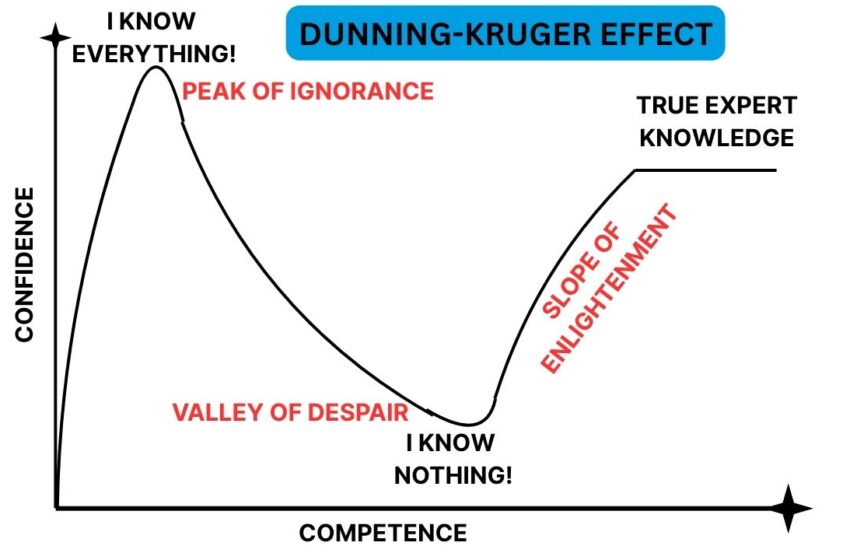The Dunning-Kruger Effect: Uncovering the Concept with Examples

Ever felt disappointed when you could not reach your expected results? Or have you ever doubted your abilities in spite of being skilled at something? If you answered “Yes” to one or both of these questions, you may have experienced the Dunning-Kruger effect!
What is the Dunning-Kruger Effect?
Definition
The Dunning-Kruger effect is a psychological concept that explains why people often misjudge their own abilities. By highlighting two opposing tendencies, it serves as a framework for analyzing the relationship between confidence and skill.
While individuals with limited knowledge and skills tend to overestimate their competence, highly knowledgeable and skilled individuals may underestimate their abilities assuming that the tasks they find simple are easy for everyone else as well. Simply put, the Dunning-Kruger effect says this:
If you are unaware of something, you also lack the ability to recognize your own ignorance of it.
How it Started
In 1999, researchers David Dunning and Justin Kruger first introduced this cognitive bias. According to their hypothesis, people often overestimate their abilities in various social and intellectual domains. They performed four studies across categories (e.g., humor, grammar, and logic) to validate this theory and observed that participants significantly overestimated their test performance and ability.
How it Works
Here’s a modern example of the Dunning-Kruger effect often seen on social media.
You must have seen many influencers with minimal medical or scientific knowledge confidently sharing health, nutrition, and fitness advice. This is because they truly believe in their ability to digest and disseminate complex topics such as dieting, exercise, and disease prevention! Although underqualified, this overconfidence often contributes to the spread of misinformation.
Conversely, true experts—such as doctors, dietitians, and physiologists—approach these topics with more caution and evidence-based reasoning. They recognize the depth and complexity of their fields and are more aware of the limitations and nuances involved.
Dunning-Kruger Effect Examples
Let us understand the Dunning-Kruger effect with some more real-life examples.
1. Dunning-Kruger effect in everyday life
Nothing explains the Dunning-Kruger effect better than people trying out DIY home repairs!
Watching a few online tutorial videos can give you the confidence to fix a leaking pipe or even rewire an electrical outlet. Despite the lack of professional knowledge and experience, all plumbing and electrical work might seem simple, causing you to underestimate the potential risks.
But in reality, only professional plumbers and electricians with years of training and hands-on experience understand the complexities and dangers involved. Overconfidence in beginners can lead to costly mistakes, safety hazards, or even bigger repairs that require professional intervention.
2. Dunning-Kruger effect in driving
Another classic real-life example of the Dunning-Kruger effect is often observed in novice drivers.
Many beginners feel that a few driving lessons are enough to master the skill and start overestimating their ability to handle complex driving situations. This can lead to reckless driving, putting both themselves and others at risk.
Meanwhile, it’s the experienced drivers who truly understand the nuances of safe driving. They are more aware of their own limitations and the potential challenges they may face on the roads, causing them to be highly cautious.
3. Dunning-Kruger effect in the workplace
You may even have witnessed the Dunning-Kruger effect in action at your workplace!
A random water-cooler discussion would have led to the statement “I can run the company better than our boss!” This shows how limited experience in management causes an employee to oversimplify the responsibilities of leadership. Such overconfidence of less-experienced individuals can lead to frustration when faced with challenges they had previously underestimated.
However, experienced leaders understand the complexities of managing teams, budgets, and long-term strategies, and they recognize how much more there is to learn and improve.
Overcoming the Dunning-Kruger Effect
Let’s face it—we are all prone to experiencing the Dunning-Kruger effect at some point in our lives. But how can we avoid it? Is there a way to overcome this phenomenon?
Here are five practical tips explained through analogies:
1. Embrace the beginner’s mindset (The Iceberg Analogy)
Only a small portion of an iceberg is often visible above the surface. But what lies underneath can at times be monstrous!
Likewise, there might be a lot more depth to something that appears simple at first glance. Recognize this and be open to learning to help expand your knowledge bandwidth.
2. Seek constructive feedback (The Mirror Analogy)
Just like how we rely on a mirror to show us what we cannot see—like a smudge on the cheek—we need to be open to receiving feedback from people who are more knowledgeable than us.
Reach out to mentors or leaders and ask for constructive feedback that can help you grow.
3. Compare yourself with true experts (The Mountain Analogy)
If you wish to excel, do not limit yourself and compare your abilities with those of beginners. Climbing a small hill can seem like a great achievement until you view the towering mountains in the distance!
Evaluate your knowledge against that of true experts in the field—this will put your skills into perspective and helps you stay humble.
4. Keep learning and practicing (The Onion Analogy)
There’s always more to learn!
Peeling an onion only reveals more and more layers underneath. A constant thirst for knowledge keeps you in the learning mode, letting you discover deeper insights.
5. Do not hesitate to question yourself (The Puzzle Analogy)
A few missing pieces of a puzzle leave the picture incomplete. But if you are unaware that the pieces are missing in the first place, you might assume that the picture is complete—when it isn’t.
Always question your understanding. Ask yourself:
- What have I not considered?
- What could I be missing?
- Could there be more to this than I realize?
Actively seek the latest information and perspectives to help expand your knowledge and improve critical thinking.
Key Takeaways
- The Dunning-Kruger effect explains the relationship between confidence and skill.
- Overcoming this cognitive bias requires self-awareness and a willingness to learn.
- To minimize overconfidence, implement strategies that help you assess your abilities more accurately and encourage continuous growth in your area of expertise.






